Investors interested in Bangladesh despite business hurdles
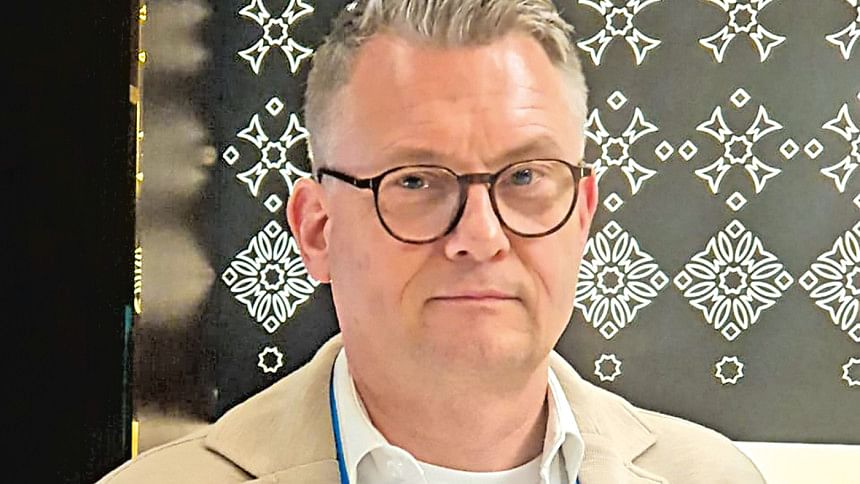
You can have the best factory in the north, but if you can't get your goods out to the port efficiently, it simply doesn't work. Infrastructure must improve.
Although Bangladesh is the world's second-largest exporter of readymade garments, it continues to struggle with major challenges, including inadequate infrastructure, cumbersome bureaucracy and murky regulations.
Still, these obstacles haven't scared off global investors. On the contrary, many, including those from Germany, are taking an even keener interest.
One such investor is Thomas Koning, chief executive officer (CEO) of Ospig GmbH, a German firm specialising in jeans and casual wear.
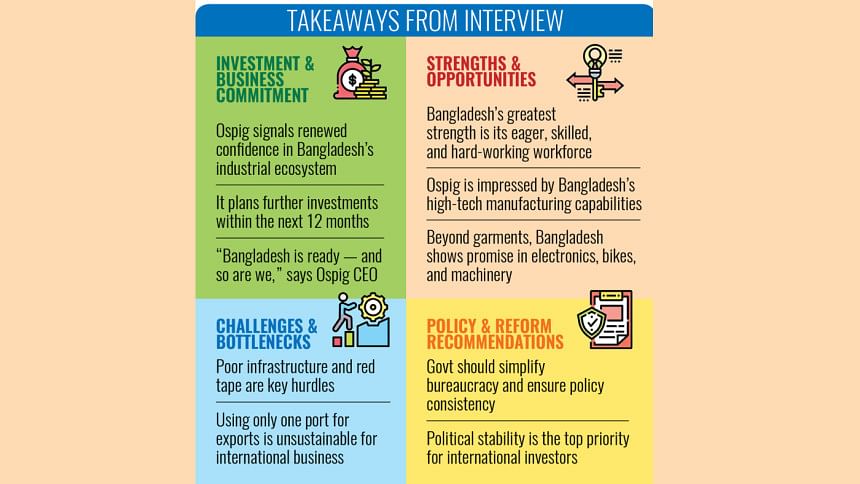
Speaking to The Daily Star on the sidelines of the Bangladesh Investment Summit 2025, Koning was frank about the barriers international businesses often face in the country.
Yet he also expressed a growing confidence in Bangladesh's shifting policy landscape and, above all, in its people.
"You can have the best factory in the north, but if you can't get your goods out to the port efficiently, it simply doesn't work. Infrastructure must improve," he said, pulling no punches.
Despite these concerns, Koning made his position clear by saying that Ospig is not going anywhere.
"The speeches we heard, particularly from the CEO of Inditex and the chief adviser of the interim government, were deeply encouraging. They have given us hope that positive changes are not only coming, they are already underway," he added.
He said that political stability was the foremost concern for foreign investors, and he believed Bangladesh was on the right track.
"What we need is stability. And we see it coming. We already held bilateral meetings here with members of the interim government. I must say, we have a very positive impression. They are focused on what truly matters at this moment," Koning said.
When asked what could accelerate foreign direct investment (FDI), he was direct. "The most important thing is to reduce bureaucratic red tape," said the German investor.
"International investors like us need a clear, streamlined structure. Talking to multiple departments for one project slows things down. We need simplicity, transparency and efficiency," he said.
According to Koning, his company has already urged the government to maintain policy consistency and adopt key reforms to unlock the country's human potential fully.
Even with optimism in the air, logistical headaches remain, particularly those tied to infrastructure.
"If you run a factory near Dhaka and want to export to Europe, you need to go through Chattogram. It's just 270 kilometres, but it takes ten hours by truck. That's not viable. There are at least 16 bottlenecks along the way," he said.
He pointed out that relying on a single port makes overseas trade far more difficult than it is supposed to be.
To support Bangladesh's ambitions of becoming a manufacturing hub beyond garments, Koning said the country must urgently invest in infrastructure and enforce its laws more rigorously.
However, one key strength lies in its people. "We've had a factory here for 30 years. We know the people. They are eager to learn, hardworking, and often well-educated," he said.
"In many countries, finding skilled manpower is tough. But in Bangladesh, you have both the numbers and the mindset. That's your biggest potential," he added.
Ospig GmbH has been operating in Bangladesh since the mid-1990s, supplying denim and casual wear to leading fashion brands worldwide.
The company's renewed commitment sends a strong signal about growing global confidence in Bangladesh's industrial prospects and investment ecosystem.
Koning said that the company plans to expand its operations further. "Yes, we have already invested millions in the garment sector here. And yes, we are planning further investments within the next 12 months," he added.
However, he declined to reveal the exact figures, saying they depended on several factors.
He did mention that Ospig is currently calculating costs for sourcing new machinery from Spain, Italy and Türkiye.
Koning also believes Bangladesh's potential reaches well beyond textiles, especially in high-tech manufacturing.
"We visited the Walton Group's factory. They are producing high-tech products like refrigerators, mobile phones, and solar systems," he said.
"We also saw a bicycle assembly plant. These visits showed us that Bangladesh is capable of more. Not just pharmaceuticals, but even machinery for the global market," he added.
"We participated in the summit with expectations, and we are leaving with conviction. Bangladesh is ready, and so are we," he commented.

 For all latest news, follow The Daily Star's Google News channel.
For all latest news, follow The Daily Star's Google News channel. 




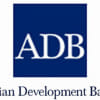
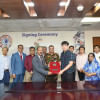

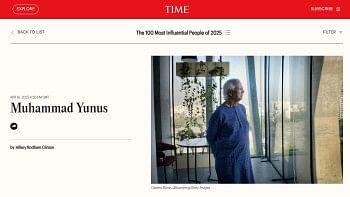
Comments